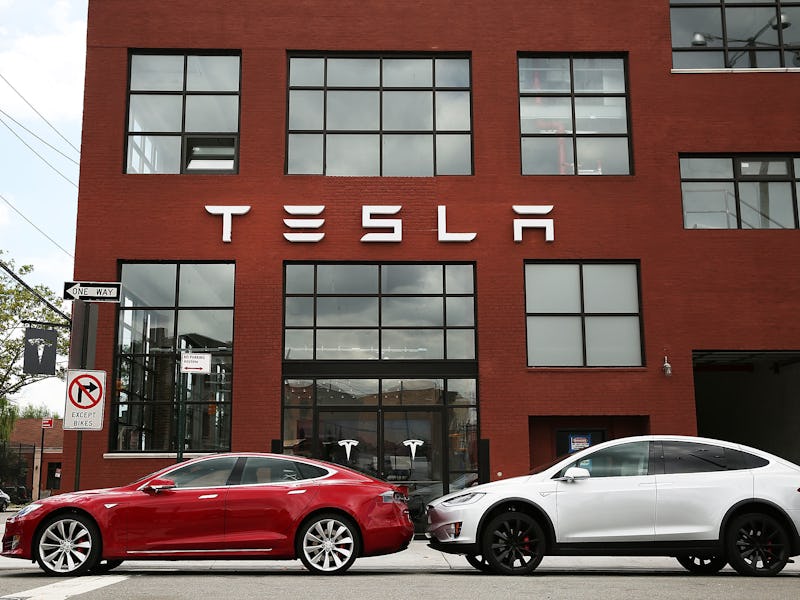Aurora Systems to Pay Tesla $100K After an Unusual Legal Spat

Elon Musk’s electric car company Tesla agreed this week to withdraw its three-month-old lawsuit against Aurora Innovation, a self-driving car startup founded by former Tesla engineer Sterling Anderson and ex-Googler Chris Urmson. The agreement calls off further legal action in exchange for a relatively paltry sum of $100,000, which is curiously low given the lawsuit’s fiery language and allegations of stolen data and broken contracts.
The lawsuit alleged, among other things, that Anderson — who was an engineer on the self-driving Autopilot technology — violated his Tesla contract by attempting to poach employees for his new startup, and, crucially, kept backups of proprietary Tesla data after leaving the company. But as it stands, Aurora is only on the hook for a $100,000 payment, which is a relatively low sum for the kind of allegations Tesla’s leveled.
Inverse viewed a copy of the agreement, which provides some more context on the case, and why it was settled so quickly out of court. After the initial allegations, Aurora ran an internal audit to scour for Tesla proprietary data. Under the agreement, Anderson and Urmson’s company will turn over the results of that audit to Tesla. The agreement also says that Tesla can conduct its own independent audit to double check that Aurora isn’t using any of its data, and Aurora will pay $100,000, which Tesla can use to reimburse the cost.
According to both parties, everything is settled. A Tesla spokesperson provided this statement:
Tesla’s lawsuit against Mr. Anderson, Mr. Urmson, and Aurora has been settled. Under the settlement, Mr. Anderson’s contractual obligations to Tesla will remain in place and will also be extended to Aurora, with additional specific protections being added to ensure there are no further violations. The settlement also establishes a process to allow Tesla to recover all of the proprietary information that was taken from the company, and it provides for Aurora’s computer systems to be subject to ongoing audits to monitor for any improper retention or use of Tesla’s property. Finally, $100,000 was paid to Tesla.
Tesla’s statement doesn’t fully clarify that the $100,000 is meant to reimburse the costs of an audit, but the agreement is pretty much in line with the company’s demands at the end of its initial filing: that Aurora submit to a thorough audit, and compensate Tesla for the costs.
Aurora, however, is also calling the whole thing a win — specifically pointing to the fact that Tesla came out strong and then backed off quickly, by legal standards. Anderson published a Medium post giving Aurora’s pretty strongly worded perspective on the suit. Here are the key passages, with our emphasis in bold:
Delivering on a lofty vision is hard; in late January 2017 it got harder. Tesla filed a meritless lawsuit against us, supported by an aggressive public relations effort. Disappointed, but determined to defend our integrity, we immediately commissioned a comprehensive forensics audit that proved what we already knew to be true: (1) no material Tesla confidential information exists on our personal computers or company systems, and (2) there is no evidence that anyone at Aurora has used or has access to Tesla confidential information.
Today, less than three months after filing (and even before we were permitted to file a response) Tesla has withdrawn its claims, without damages, without attorney’s fees, and without any finding of wrongdoing. We have even agreed to reimburse the cost of a future audit to demonstrate the integrity of Aurora’s intellectual property.
In spite of this distraction, we’ve made great progress these last few months and are excited to now focus all of our energy on making transportation safer and better for all. We’ve been developing self-driving vehicles since long before it was trendy, and remain committed to bringing this important technology to market with the right team, doing things the right way.
Under the agreement, Anderson and Aurora will continue to respect the former Tesla employee’s non-solicitation agreement for one year (a non-solicitation agreement means Anderson can’t try to convince any current Tesla employees to come work for him.) Other than that, Anderson told Inverse that his new company is looking forward to continuing its work. “We’re super excited to focus explicitly on what we came to do, which is deliver self-driving vehicles to the world,” Anderson says.